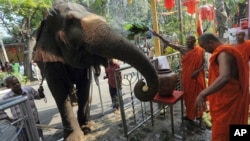In Sri Lanka, an elephant in the backyard has long been a sign of wealth, privilege and power. But these days it may also be a sign that someone is breaking the law.
Capturing wild elephants has been banned for decades here. Registration records indicate there should be only 127 elephants in captivity, most of them older. Yet they are a staple of the South Asian island nation's 400 or so yearly processions - traditional ceremonies honoring a marriage, calling for peace or praying for rain - and in each there are always a few young elephants clumsily cantering to keep up.
“In Sri Lanka, people measure the success of the processions by the number of elephants,” said the Rev. Magalkande Sudantha, a Buddhist monk.
Despite concerns that the animals may be abused, spectators always expect a parade of elephants wearing jangling ornaments, and babies are a special attraction.
“There is no beauty in processions without elephants,” said Janaka Alwis, a 48-year-old city council employee in Gampaha, north of Colombo. “People go to watch because of the elephants, and to count them.”
Aware of the ongoing elephant racket, authorities have been cracking down. In the last two years, the government has confiscated 39 elephants whose owners produced either false permits or none at all. Some had paid as much as $200,000 per captured animal when a previous government was in office, according to Wildlife Minister Gamini Jayawickrama Perera.
Those facing prosecution for illegally keeping elephants include one judge and a Buddhist monk. Police are also considering charges against people suspected of rounding up wild elephants for profit.
The practice of taming wild elephants includes starving, beating and scaring them into submission, while keeping them chained up at all times, conservationists say.
“Taming a wild elephant is an extremely cruel experience for the animal,” said Prithviraj Fernando, who runs the Center for Conservation and Research in Sri Lanka. “Whether it's a temple or a private person, that's how it is done.”
The Sri Lankan elephant is one of three subspecies of Asian elephants and is found only on the teardrop-shaped Indian Ocean island. In the 19th century there were believed to be up to 14,000. That number fell to fewer than 3,000 before hunting and capture were banned. But while the population has grown since then to nearly 6,000, according to the island's first official elephant census in 2011, they are still considered endangered and under threat from habitat loss and degradation. They are confined to small, isolated pockets of jungle and pasture in the north and the east.
For Buddhists, who make up 70 percent of the island's 20 million population, elephants are believed to have been servants of the Buddha and even a previous incarnation of the holy man himself. Sinhalese kings rode elephants into battle. And every year, colorfully decorated tuskers carry an ornate box containing a replica of one of the Buddha's teeth.
“The elephants carrying sacred relics are very fortunate. Even we don't have that opportunity,” said housewife Kanthi Sriyalatha, 53. She said the sight of the animals is also a thrill. “Children wait in anticipation to watch processions because they want to see the elephants.”
Conservationists said that, given the importance given to using elephants in religious ceremonies, the government should be stepping in to manage their care while ensuring no more are captured in the wild.
“We need to impose some restrictions on ourselves. There are about 30,000 Buddhist temples,” Fernando said. “If every temple wants to have a procession with an elephant, it is not possible.”
The government is planning to set up its own pool of captive animals to be hired out to temples for ceremonies.
“We have to create a pool of elephants” for processions, said Perera, the wildlife minister. “We are creating a process now for how to issue permits, how to release some of the elephant babies” to temples for their upkeep and use in processions.
Under the plan, some would be kept in a so-called elephant orphanage. But some would go to families or temples that are financially capable of feeding and caring for them.
Some elephant owners say those who claim mistreatment are acting on Western notions of conservation and animal welfare.
“Elephants living with us do better than the animals in the wild,” said Harsha Dharmawijaya, whose family has kept at least one elephant for 96 years. “We scrub their bodies and bathe them, feed them and treat their illnesses.... In a way this is a noble act.”
Some critics, however, note that Buddhism is a faith that preaches compassion for nature.
“If the Buddha was alive, would he condone what's going on? I don't think he would,” said Sumith Pilapitiya, a former World Bank environmental specialist who argued that the government should focus on the animals' welfare rather than religious norms.
“In the name of Buddhism... we are ill-treating animals,” he said.
Sri Lanka Cracks Down on Owners of Elephants Taken From Wild

COLOMBO, SRI LANKA —



